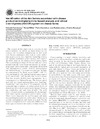Identificador persistente para citar o vincular este elemento:
https://accedacris.ulpgc.es/jspui/handle/10553/52588
| Título: | Identification of the risk factors associated with cheese production to implement the hazard analysis and critical control points (HACCP) system on cheese farms | Autores/as: | Carrascosa, Conrado Millán, Rafael Saavedra Santana, Pedro Jaber, José Raduán Raposo, António Sanjuán, Esther |
Clasificación UNESCO: | 3109 Ciencias veterinarias | Palabras clave: | Cheese farm Hazard analysis and critical control points (HACCP) Pathogenic microorganisms in cheese Risk factor |
Fecha de publicación: | 2016 | Publicación seriada: | Journal of Dairy Science | Resumen: | The purpose of this paper was to evaluate, by statistical analyses, risk factors on cheese farms that can influence the microbial contamination of their products. Various assessment tools, such as cheese production questionnaires, food handlers' knowledge testing, and hygiene assessment system surveys, were used on 39 cheese farms on the island of Gran Canaria, Spain. The microbiological status of 773 raw milk and cheese samples from the cheese farms was assessed by enumerating total viable counts and 4 pathogens: Escherichia coli, Staphylococcus aureus, Listeria monocytogenes, and Salmonella spp. The results revealed that the highest contamination by Staph. aureus (4.39%, >105 cfu/mL) was found in milk, and the highest contamination by E. coli (5.18%, >103 cfu/mL) was found in cheese. Very few samples (0.52%) were contaminated by L. monocytogenes or Salmonella spp. The factors associated with any tested microorganism were "handling," "knowledge," and "type of milk." Subsequently, multidimensional logistic analysis for contamination by E. coli showed an independent association for factors "cleaning and disinfection test" and "type of milk." The probability of total aerobic contamination of milk increased with lower hygiene assessment system survey scores. These results emphasize the need to apply and maintain good hygiene practices, and to study risk factors to prevent contamination and bacterial growth. Further research is required in other areas with different cheese farm types to reinforce the validity of these results. | URI: | https://accedacris.ulpgc.es/handle/10553/52588 | ISSN: | 0022-0302 | DOI: | 10.3168/jds.2015-10301 | Fuente: | Journal of Dairy Science [ISSN 0022-0302], v. 99 (4), p. 2606-2616 |
| Colección: | Artículos |
Citas SCOPUSTM
40
actualizado el 08-jun-2025
Citas de WEB OF SCIENCETM
Citations
37
actualizado el 12-ene-2026
Visitas
73
actualizado el 10-ene-2026
Descargas
112
actualizado el 10-ene-2026
Google ScholarTM
Verifica
Altmetric
Comparte
Exporta metadatos
Los elementos en ULPGC accedaCRIS están protegidos por derechos de autor con todos los derechos reservados, a menos que se indique lo contrario.
